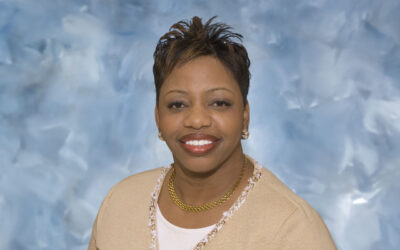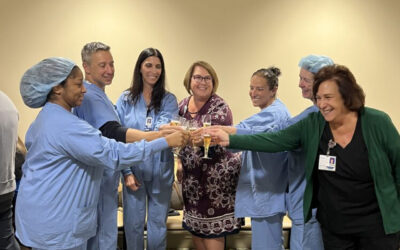Remembering Nursing Pioneer, AORN Founder
By Jim Orr
Western Nebraska Observer


Edith Dee Hall’s gravestone at Kimball Cemetery is inscribed, simply, with 1897-1971.
What’s important, though, is not the birth and death years on one’s grave marker.
It’s that dash between the years.
It’s how a person lived during the dash – and Edith Dee Hall lived quite the dash. She might be the most accomplished Kimball native that Kimball doesn’t know much, if anything, about.
“It’s not every day that a little girl from Kimball, Nebraska, helps change the way surgery is done around the world,” said Brenda Ulmer, a renowned perioperative nurse and past board president of AORN, the Association of periOperative Registered Nurses.
Hall was born into a family with roots in Kimball’s pioneer era and graduated in 1915 from Kimball County High School.
She moved to, and died in, New York City.
In between is the story of a noteworthy figure in nursing history.
This is Edith Dee Hall’s story.
Discovering A Nursing Icon
The reason that Hall’s Kimball connection is being rediscovered is because she founded the Association of Operating Room Nurses, as it was first known, in 1949 and Ulmer – the devoted member of 45,000-member AORN that she is – felt that operating room nurses had much more to know about one of their matriarchs.
“I started searching for more in-depth information on Edith Hall earlier this year while working on a book update for AORN,” Ulmer told the Observer. “I wanted to include more information about Edith as the founder of AORN. I just felt that we need to know more about her. I also wanted to learn how a woman from Kimball, Nebraska, made it from Kimball to New York City, by way of Washington in the 1920s – an amazing accomplishment.”
Ulmer learned of Hall’s burial in Kimball, and she contacted the Observer in search of an obituary that might have run in the paper.
The Observer did, in fact, run a brief notice about Hall’s graveside services in the April 15, 1971, edition, but it didn’t say much about her life. It mentioned that she was a registered nurse who was born in Kimball, died in New York City and belonged to the Episcopal Church.

Hall’s survivors were identified as half-sister Beatrice Sheahan of New York, brother Alfred Hall of California and Genevieve Dillon of Kimball. Sheahan, by the way, is buried next to Hall.
The report included no reference to Hall’s stature in the nursing profession.
Hall also is missing, at least as a featured subject, from the voluminous 1988 history book “Kimball County Nebraska 100 Years.”
Hall’s very existence is even new to Karen Bivens, a knowledgeable student of local history and board member with the Plains Historical Society.
“I never heard of the lady, but that doesn’t mean anything,” Bivens said. “If she was born and raised here, it shows that no matter where you’re from, even if you’re from a small town, you can achieve great things.”
Piecing Together A Life’s Work
For Ulmer, piecing together Hall’s journey is a mission.
“As is often the case,” Ulmer reflected, “we don’t know much about the folks who came before us. I was surprised at how little we know about Edith … and how she had the grit to make it from Kimball to New York and accomplish what she did.”
Bivens unearthed information in the Observer from 1915 to 1920 that meshes with some of Ulmer’s findings about Hall, who graduated from KCHS in 1915.

The paper kept up with Hall’s post-high school progression, reporting that she was attending the University of Nebraska at Lincoln in 1917, applied in 1918 to a military training school for nurses, went to work at a New York City area hospital in Newark, N.J., in 1919, and returned to visit her parents for a month in 1920.
Why did Hall became a nurse? Ulmer believes that she found out.
“In response to an outreach by the government during World War I, thousands of women applied to become nurses to support the war effort,” Ulmer explained. “I found Edith’s brother’s draft card. He was drafted into the Army in 1917. I am still not sure of her path, but it seems like she answered the call to duty.”
Hall was trained and graduated from Walter Reed Hospital in Washington, D.C., and later was operating room supervisor at the New York Polyclinic Medical School and Hospital. She was AORN’s first executive secretary, serving from 1957-62, and in her later years was a consultant and writer for “Hospital Management” magazine.
Ulmer said it looks like Edith spent time at Fort Des Moines Army Hospital before going on to Walter Reed Hospital, which is consistent with an Observer report in 1919 that she was in Des Moines, Iowa.
Hall’s influence on AORN was immense. The year after she died, the organization dedicated its annual conference to her. Her sister, Beatrice, was invited and opened the association’s exhibition hall.
“AORN has been a strong organization almost from the beginning,” Ulmer said. “Our standards, recommended practices and guidelines form the bedrock on which patient care is formed in the United States and around the world.”
Much credit for that goes to Edith Dee Hall, that little girl from Kimball who founded AORN and lived quite the dash.










